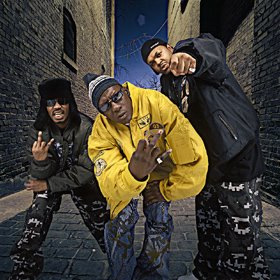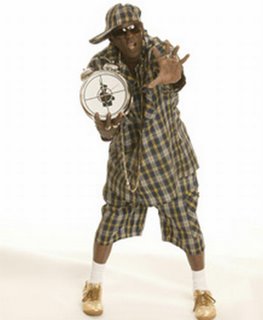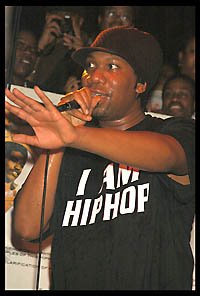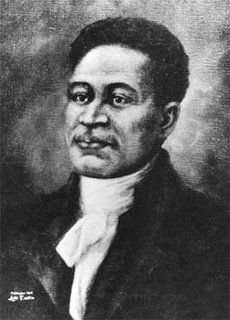America isn't ready for the Dirty Dirty
Check out
:Oscar Winner Hits Angry Chord:'Pimp' Song Denounced for Exploiting Negative StereotypesWith the song from the Hustle and Flow soundtrack causing alot of outrage this week, I guess what this represents is the crossing over of the whole grimy, stripper and pimp, Southern fried, Murder Dog, dirty dirty culture into the American mainstream, and guess what folks? America doesn't like it!How suprising is that? LOL.Below is an interesting essay from the
Washington Post by Philip Kennicott:
At dinner, say a month from now, perhaps it will be your very unhip great aunt who says it. Someone skimps her on dessert, so she looks plaintively down the table, waits for a moment of silence and then delivers the line -- "It's hard out here for a pimp."
Witness the explosion of a new hip-hop meme into "white culture." Yes, it was a memorable Oscar moment when Three 6 Mafia won the best song for their musical contribution to "Hustle & Flow." And yes, the song has a catchy tag melody. But this is a cultural brush fire. Oscar host Jon Stewart seemed to know it, and started the jokes rolling.
By 9:17 a.m. yesterday, Kathryn Jean Lopez, a poster on the National Review's conservative The Corner Web site, said it best: "The worst part about the Oscars last night, of course, is that I can't get 'It's Hard Out Here for a Pimp' out of my head this morning." Not surprisingly, by midafternoon, http://technorati.com , a Web site that tracks mentions of anything and everything in Web logs, posted an explosion of hits. In nifty visual form, a 30-day graph of the number of times, daily, the song has appeared on Web sites shows what it looks like when a song sneaks in under the radar, then ignites. It looks like a ski jump from hell.
For a brief moment, the song had a double status. Within hip-hop circles, according to Elliott Wilson, editor-in-chief of XXL magazine, the Oscar nod was affirmation for a rap group known as uncompromising (even if they cleaned up the lyrics Sunday night and put "witches" where the other women used to be). At the same time, a vast new audience got hip to the song --"It's the talk of the town," Wilson said -- and sent it down the long road of appropriation and misreading that almost inevitably accompanies cultural objects when they cross over into the world of Whiteness.
Why this song? Why now? When "white" culture borrows from "black" culture, it doesn't necessarily borrow what it thinks it's borrowing. The real meaning of the song, its reference to pimps, its role within a movie documenting the often pathetic efforts at stardom of a pimp who also makes music, isn't particularly relevant. When a piece of cultural stuff makes the transition into the mainstream, it often does so on terms entirely different from what it originally meant.
In this case, it's because the song's most catchy line, "It's hard out here for a pimp," captures the peculiar quality of complaint without merit in American cultural life. We all complain, and complaint has so cluttered our rhetorical landscape that we mostly tune out the din of gripe -- except, of course, for our own complaints, and the egregiously unmerited complaints of people we don't like. Despite the evolution of the word "pimp" to loosely embrace all manner of "playahs," and a celebration of "pimp style" (see: "Pimp My Ride"), most of us still don't like real pimps. So pimps who complain that "It's hard out here" can stand for all those people who complain willfully, scandalously, about things they have no right to complain about.
For instance, the ultimate egregious complaint: "It's not easy being beautiful." Or a close second, "Being rich isn't everything it's cracked up to be." These are complaints from people we envy, and belong to one category of self-delusion. The pimp complaint comes from another place, from someone deluded not by his success, but by his antisocial status. But all of these gripes elicit a sense of bemused outrage because they are complaints from someone who has no right to complain.
Perhaps the line has resonance because so much of American political discourse is about determining who is allowed to feel properly aggrieved. Is it Muslims offended about sacrilegious cartoons, or defenders of free speech seeing their high holy delimited? Daytime talk radio has essentially evolved into a vast trading floor for the commodity of complaint. And slowly we drift to a new understanding of the basic social contract: Your liberty ends where my outrage begins.
A pimp complaining that "It's hard out here" has, in a single outrageous leap, passed by the issue of whether he has any right to grievance, and is demanding -- so shamelessly that it's funny -- all the perks and merits of someone who legitimately feels wronged.
The musical setting of the line, a deliciously catchy and melodic tag, confirms the scandal. The line that the conservative Kathryn Jean Lopez and a zillion other people can't get out of their heads is essentially a melodic ending, a sequence of notes that seems to conclude a musical thought. Yet it keeps repeating, as if the person who insists that it's hard out here for a pimp is continually saying, "Case closed." I'm right, end of argument, or as Samuel Johnson (who also had an infuriating habit of shutting down debate) might say, "It is hard out here for a pimp, Sir, and there's an end on it."
It's also the sexiest line of the song -- and was made even more so in the version heard for the mainstream Oscars audience. In the film, it is the addition of a female vocalist adding what might, in church music, be called a descant -- a line that floats above all the rest of the noise -- that completes the song, that proves that the rapper might, in fact, have what it takes to be a star, even at the cost of the people around him.
Melody and femininity are intricately allied, and the union of melody to another element, words in a song, or rhythm and harmony in a symphony, has suggested sexual union throughout music history. For an attractive woman to sing "It's hard out here for a pimp" suggests that the pimp has found sympathy, against the odds, in the form of a woman who will articulate his complaints for him.
But are we meant to take this complaint seriously? The line sounds so clean, so pure in relation to the thickets of hip-hop rhythms underneath it, that it has the stylized sense of being purely ornamental, almost baroque in its detachment from everything else around it. Like a swirl of sumptuous fabric draping from an unnecessary angel in a painting by Tiepolo, it's funny by virtue of its excessive prettiness.
And so "It's hard out here for a pimp" enters white culture, as so many black memes do, with a wink and a nod. Of course your great aunt sitting down the table complaining in an impeccably white way that it's not easy for a pimp isn't thinking about real pimps. She may not even know what real pimps do. But that doesn't matter. Black memes in "white culture" are vaguely scandalous, used with a wink and nod that say, "I know this is transgressive, but I'm not going to learn anything more about it."
Curious, then, that as news of the song's big win starting racing around the Internet, there was some confusion about the exact line. An Associated Press report began, "The Oscar people showed they were ready to embrace a song called 'It's Hard Out There for a Pimp.' " But the line was, "It's hard out here for a pimp."
Here, there. Inside, outside. The slip of the pen captures exactly how these things play out when appropriated across class and race lines. No one would ever say, and mean, "It's hard out there for a pimp," which would suggest actually sympathy for pimps, and for people out there, on the outside. But it's hard out here for a pimp, appropriated into white culture, becomes a way both to borrow the outsider's inherently cool status, while completely denying that any complaint from that place has value.







